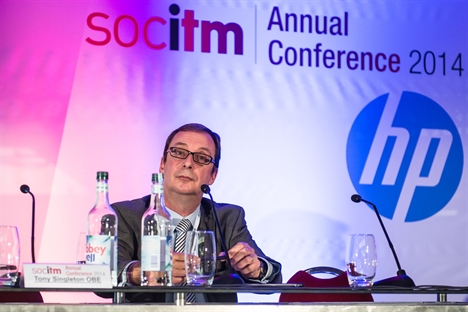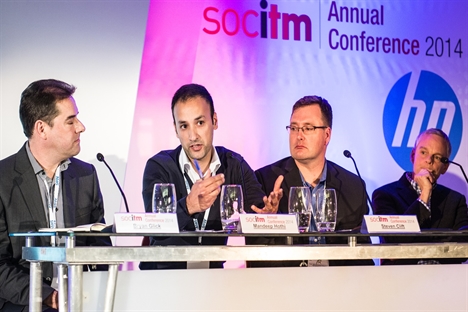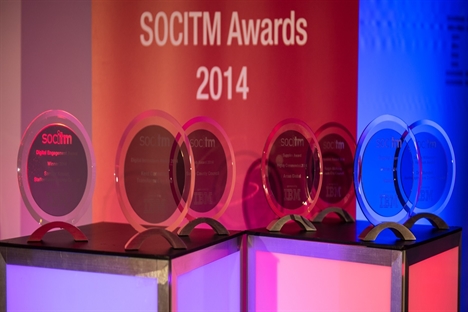13.12.14
Socitm Conference: Collaboration will drive digital forward in public services
Source: Public Sector Executive Dec/Jan 2015
PSE’s David Stevenson reports from Socitm’s annual conference in Manchester.
The next government could help deliver a culture of ‘digital by design, open by default’ for public services – but not through a ‘one-size-fits-all’ method like the Government Digital Service (GDS), according to Socitm president Nick Roberts.
Speaking to about 350 delegates at the society for public sector IT managers’ annual conference in Manchester in late October, Roberts said: “But there is an opportunity for some resources to be built to share expertise, to deliver some components of shared platforms and assets that can be used by public services in a very meaningful way to be able to catapult through and move through to a digital design, open by default landscape.”
Roberts added that the whole point of local public services is local accountability and local determination of priorities in services. “So a one-size-fits-all approach cannot be taken for public services”.
Innovate, redesign and collaborate
During his opening speech at the two-day conference, held at Old Trafford stadium, he also launched a policy briefing on how local digital public services can best be delivered.
The briefing, for politicians and senior policy and decision-makers, explains that public organisations looking to embrace digital need to adopt three core principles:
- Innovate to empower citizens and communities
- Redesign services to simplify, standardise and automate
- Collaborate to share and re-use resources and assets
Labour’s shadow Cabinet Office minister, Chi Onwurah MP, also spoke, calling for local authorities to “come together” and share advice on best practice, applications and the design and development of platforms, while being dedicated to meeting citizens’ needs.
If Labour wins power next year, she said: “The first thing I would be asking for is peoples’ partnership to work together to achieve the really difficult challenges of transforming and transitioning the system from where we are, given the existing and multiple legacies, to where we need to be – shared platforms and open architectures co-produced with citizen services.
“My experience is that technology, whatever the question is, is not the solution on its own, so the first thing we need is to work together.”
A 30-year journey
In a later presentation, Mandeep Hothi, senior programme manager for the Innovation Lab at Nesta, said technology has the power to change the relationship between citizens and the state by giving them more influence and control over services. But we are at the beginning of what is likely to be a 30-year journey in delivering this empowerment.
Mark Thompson, senior lecturer in information systems at Cambridge Judge Business School and ICT advisor to the Cabinet Office, said to deliver effective change, local government needs to start “rethinking its business models”.
He asked the audience: “Does anyone think they can go digital without a fight within their organisation? Of course not, this is because it effectively disintermediates a lot of the way you [local authorities] run your businesses. It is about digital leadership as well as management. We need to start rethinking our business models.”

Overcoming barriers to using and procuring cloud services
Tony Singleton, director of digital commercial programme at the Cabinet Office’s Government Digital Service (GDS), discussed its growth and how it is changing the government’s and wider public sector’s relationship with digital services and technology.
G-Cloud cumulative sales stand at £314m, averaging £25m a month, with most contracts going to SMEs. Central government is still the main procurer (80%), compared to 20% for the wider public sector. But Singleton said: “It is not about central government vs local government. It’s about making the best of what we’ve got, what makes sense commercially, and whether there should be a common commissioning platform that provides for everyone’s needs.
“For me it is about sharing experiences and ways of working to deliver the best value for money.”
Singleton later revealed plans to allow suppliers to amend the services they offer via G-Cloud without having to wait for new iterations of the framework. Amendments to EU regulations on dynamic purchasing could be applied to G-Cloud at the earliest opportunity. “We are talking to Treasury solicitors about how we can move to a dynamic system as soon as the law allows it,” said Singleton.
One delegate raised concerns about the maximum two-year length of G-Cloud ‘infrastructure as a service’ contracts, covering services such as web hosting. Others complained that it would be too expensive to switch suppliers every two years – given the high costs of each migration and the need for staff training on any new system – Singleton said the point is that no-one ever has to move at any one time, just reassess. There are no plans to change the short-term let of contracts.
“When you are coming to the end of a two-year contract, all of those arguments need to go into your decision on whether you are changing that supplier,” he said.
Another delegate asked Singleton how the government would be dealing with the quality of suppliers listed on G-Cloud. In response, he said his team was planning a discussion forum where users can recommend the best suppliers, and warn people off the ones who do not meet the highest standards.
“We are looking at creating a community. Not the Trip Advisor route – that could get us into legal difficulties. But we do want to do more to put buyers in touch with other buyers – through collaboration, we can work out the quality suppliers,” said Singleton.

Socitm Panel session: Leadership, vision and ambition for the digital age
One of the most popular sessions at Socitm 2014 was a panel session on future ‘ambitions for the digital age’. Mark Thompson kick-started the debate on a critical issue for local government: those driving and funding digital government at councils are also those most threatened by its implications.
“It is, in theory, a case of turkeys voting for Christmas,” said Thompson. “There hasn’t been a discussion about who loses in government out of digital. In the past, in other industries where change has happened, the people who lost out, generally, were those who run the bureaucracies – who thrive out of the silos.
“We need to have a national debate; we are talking about a new business model for government.”
On citizen-centred services, Steven Clift, White House ‘champion of change for open government’ and executive director of E-Democracy.org, added that although few people want to deal with government services, they at least want them to be online and easy-to-use.
“Make it the best experience possible,” he advised. “It might seem old-fashioned, but get their email address and have a weekly/monthly newsletter about what is new. You need…a connection that brings them back.”
Nesta’s Mandeep Hothi said citizen engagement depends on how the institutions of government respond to citizens. “Creating a two-way dialogue is essential for broader, longer-term engagement,” he noted. “If you can provide services to citizens that reduce the amount of time they have to spend accessing that service, then the demand will be there.”
Though councils shouldn’t attempt – at least in the short-term – to replace face-to-face engagement, he warned.

Socitm Awards 2014
Following the presentations on the first day of the conference, Socitm announced its award winners for 2014. The winners were:
Digital Engagement – Sander Kristel, CIO, Staffordshire County Council
Innovation – Kent Connects: Transformed by You
Website – Surrey County Council
Supplier – Verisec (Highly Commended – Arcus Global)
Research – Dan Blundell, LGSS
Member – Ralph McNally, Leeds City Council
The awards were sponsored by IBM, who also presented the graduation certificates for the Socitm/IBM Top Talent programme at the event.
Adrian Hancock, chief executive of Socitm, said: “The quality of all the entries for the Socitm Awards was very high and I would like to wholeheartedly congratulate our 2014 winners.”
Tell us what you think – have your say below or email [email protected]